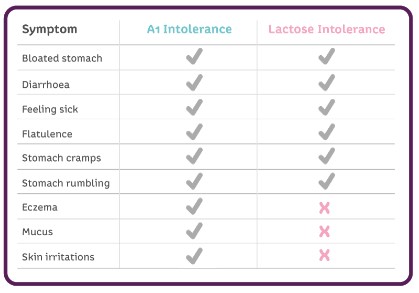There has been much debate over the years when it comes to lactose intolerance, particularly over whether people are really suffering from lactose intolerance or whether symptoms are being labelled and misdiagnosed.

(photo credit: a2 Milk™)
Indeed, since becoming part of the allergy and intolerance world I have witnessed first-hand some very heated debates on the subject. So, why am I opening a can of worms?
Well, today exciting new research has come to light which throws the presumptions surrounding lactose intolerance into disarray. This research is the first to investigate the effects on humans of A1 versus A2 protein types.
Amazingly, it has been proven that the participants of the study reported a2 Milk™ to be:
‘significantly gentler on their digestive system, with less inflammation associated with bloating and abdominal pain’
This ground breaking research is proving that those suffering with believed lactose intolerance actually might not be. It’s a bold statement, and one which has some impressive stats backing it up!
What is lactose intolerance?
It’s a common digestive problem, which many people believe they are affected by. It’s caused by the body being unable to digest lactose, which is a sugar found in dairy products, such as milk.
Symptoms will usually develop within hours of consuming food or drink that contains lactose, and can include:
- Bloating
- Cramping
- Loose bowels
- Flatulence
- Sickness
What causes lactose intolerance?
Our bodies digest lactose by creating lactase which breaks the lactose down into 2 sugars (glucose and galactose). These sugars are then absorbed into our bloodstream.
For those with a lactose intolerance, they don’t produce enough lactase, causing the lactose to remain in the digestive system. Bacteria then ferments it, which causes the production of natural gases. It is this which causes the symptoms that people associate with lactose intolerance.
It is important to be aware that lactose intolerance is NOT the same as a milk allergy. Allergy is caused by the immune system reacting to foods, causing symptoms like wheezing, itching, rashes and more. With an allergy, even the tiniest amount will cause a reaction. Whereas an intolerance will mean that small amounts are most likely able to be consumed without experiencing problems. However, each person is different, and whilst one person may be alright, another may have symptoms triggered on consumption.
Why is this important?
The symptoms believed to be lactose intolerance induced, are actually very similar to symptoms triggered by A1 protein intolerance.
In a previous article I explained about the difference between A1 and A2 protein, which you can read more about here. Essentially, cow’s milk originally only contained the A2 protein, and no A1. It is due to human domestication that A1 protein is now found in the majority of cows today, with regular cow’s milk containing a mixture of A1 and A2 protein.
The Study
China is known to have the highest levels of lactose intolerance, and it is believed that up to 90% of the population is affected. It made sense to hold a trial in China based on these stats, and was conducted by Professor Sun Jianqin from Hua Dong Hospital.
The study inclusion criteria included:
- Male or female
- 25-68 years of age
- Irregular milk consumption (determined through a questionnaire)
- Self-reported intolerance to commercial milk
- Self-reported digestive discomfort (mild to moderate) after milk consumption
- Normal ECG
- Normal blood pressure during quiet respiration
Participants were only enrolled if they agreed to the following:
- No medication
- No nutritional supplements
- No additional dairy products
The participants were recruited through community hospitals and were made fully aware of the objectives of the study, the benefits and any associated risks with taking part, including triggering of symptoms with any pre-existing conditions they may suffer from such as IBS, constipation etc.
104 people registered to take part in the study, and underwent a urinary galactose test before being signed up.
45 participants (21 males, 24 females) with self-reported intolerance to cows’ milk met the eligibility criteria, with 23 participants confirmed to be lactose intolerant based on the results of the urinary galactose test.
How was the study carried out?
The 45 participants took part in a double-blinded, randomised 8-week crossover study. Rice milk was consumed for 2 weeks as a dairy wash-out, followed by 2 weeks of drinking conventional cows’ milk. This was then followed by another 2 week wash-out, before 2 weeks of consuming a2 Milk™. At all times, participants and researchers were blinded to the milk being consumed at all phases of the trial.
The results
Participants experienced significantly higher gastrointestinal inflammation, elevated blood markers for immune and inflammation response and stool transit delays when consuming ‘normal’ cows’ milk.
When consuming a2 Milk™, all of the above issues disappeared for the participants, including those with a confirmed lactose intolerance based on the urinary galactose test!
This is truly ground-breaking!
Let me just repeat that:
The trial found that a2 Milk™ caused NO gastrointestinal disturbance in any study participants – most tellingly, including those confirmed to have issues digesting lactose’
The study also revealed:
‘individuals in the trial who drank milk containing only the A2 protein had a faster response and lower error rate in cognitive function tests compared to those who drank normal milk’
This is in line with continuing research showing a clear link between brain function and digestive health!
What does this mean?
For anyone who is suffering with symptoms they believe to be triggered by a lactose intolerance, and has removed cows milk from their diet as a result, it opens up the opportunity of bringing milk back into their diet.
Click here for guidelines to check whether a2 Milk™ would be suitable for you.
DISCLAIMER – If you have any doubt, please consult a Health Care Professional before attempting to try this milk
I’ve shared this great infographic produced by a2 Milk™ before. It gives a really good explanation of the difference between lactose and A1 protein intolerance:

It’s easy to see why symptoms from A1 protein intolerance and lactose intolerance can be confused!
My thoughts
a2 Milk™ has been a game changer for me. I’ve shared before the struggles I’ve experienced with ongoing IBS issues, and how my symptoms have drastically improved since using only a2 Milk™!
I embarked on a 4-week challenge, and the results changed the way I thought about milk!
As I’ve said before, and will repeat again, a2 Milk™ is NOT suitable for Callum or anyone else suffering with an allergy, but for people like me, and those who have self-diagnosed an intolerance to lactose, it might just change everything!
Have you tried it yet? What did you think? Has it changed things for you?




